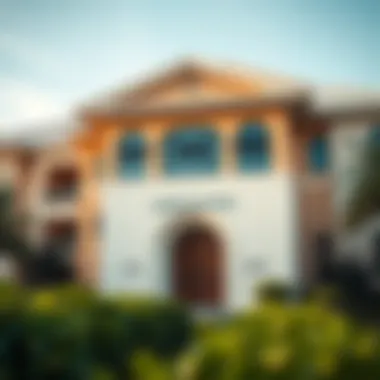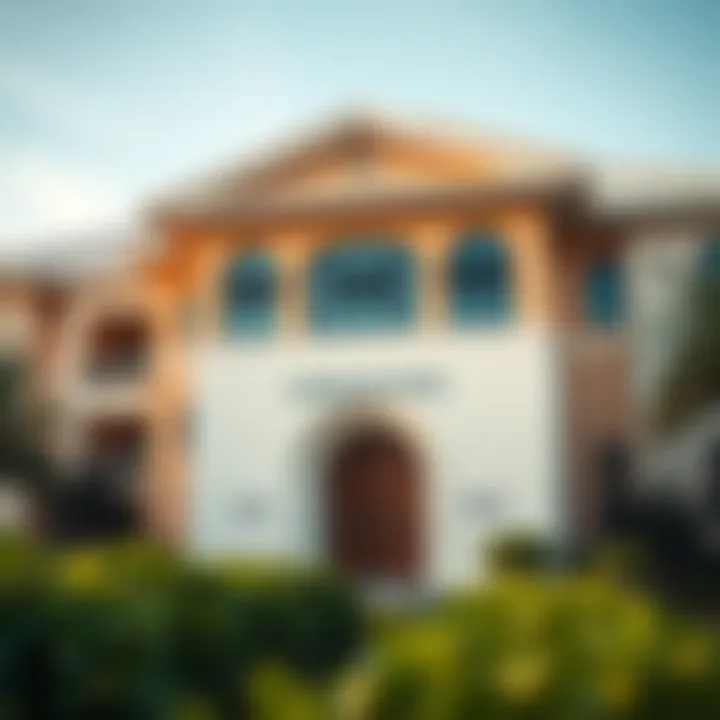Exploring the UAE's Most Expensive School


Intro
In the sprawling landscape of the United Arab Emirates, education has taken on a distinctly luxurious form. As parents seek the best for their children, a certain segment of private education stands out—not only for its quality but also for its price tag. This article pulls back the curtain on the most expensive school in the UAE, offering a detailed analysis of what justifies its staggering tuition fees.
Here, we will dive into market trends currently shaping private schooling in the UAE. This includes understanding current real estate pricing and identifying emerging neighborhoods that are influencing the educational landscape. Additionally, we will explore investment opportunities linked to high-end education systems, weighing short-term versus long-term strategies, as well as potential financing options.
Through this examination, parents, educators, and investors can gather insights to navigate the intricate yet rewarding domain of luxury education. With families willing to invest significantly in their children's future, understanding these intricate factors becomes not just relevant but essential.
The journey begins as we explore the market trends that are not only influencing the pricing of education but also altering the very fabric of private schooling in this opulent region.
Market Trends
As the UAE continues to develop as a hub for international investors and expatriates, the educational sector is being molded by constant demand. In this context, identifying market trends in education sets the stage for understanding the dynamics of the school we are assessing.
Current Real Estate Pricing
One cannot speak about expensive education without acknowledging the cost of living that surrounds it. Real estate prices in prime locations directly influence the tuition of institutions. Properties situated in areas such as Dubai Marina or Abu Dhabi's Corniche enjoy premium pricing, reflecting the allure of a lavish lifestyle.
- Luxury accommodations often come at an average rental price of AED 15,000 to AED 25,000 monthly for a two-bedroom apartment.
- On the purchasing side, expect to shell out close to AED 2 million for a three-bedroom flat in a premium neighborhood.
Such real estate costs significantly contribute to the overall expenses schools incur, which is then passed on to parents through fees. Therefore, discerning families may weigh decisions on location heavily against quality of education.
Emerging Neighborhoods and Developments
Several neighborhoods are experiencing revitalization, spearheaded by emerging developments.
- Areas like Dubai Hills and MBR City are becoming desirable due to integrated living spaces, including top-notch schools, parks, and shopping facilities.
- Ventures such as the Dubai Expo 2020 site have also ushered in growth, drawing families toward these newly established communities.
As these neighborhoods flourish, the educational institutions that follow suit are often at the higher end of the pricing spectrum, offering unparalleled facilities and educational philosophies.
Investment Opportunities
Investing in luxury education, especially within the UAE context, poses unique opportunities. The intersection of real estate and education rewards both short-term and long-term investors by capitalizing on a growing demand for elite educational institutions.
Short-Term vs Long-Term Investment Strategies
Investors can discern two primary strategic approaches:
- Short-Term: Quick returns focusing on properties in educational neighborhoods can be profitable. Time-sensitive developments or limited enrollment contracts present an opportunity to capitalize on rising market trends.
- Long-Term: The long game offers stability, with investments in schools likely to yield returns as demand for quality education continues to rise. Investors may thus reap the benefits of sustained growth in student numbers alongside rising property values.
Financing and Mortgage Options
For families looking to settle in high-demand educational zones, understanding mortgage options becomes imperative.
- The UAE offers various financing entities with competitive rates, allowing for flexible mortgage plans.
- Familiar banks such as Emirates NBD and Abu Dhabi Commercial Bank provide tailored packages that cater specifically to expatriates, making it easier to navigate financial commitments.
Getting a handle on these financial details can lighten the burden of investing both in a home and a child’s education, making it a considered commitment rather than a mere expense.
In summary, examining the most expensive school in the UAE leads to a multifaceted discussion on market trends and investment strategies. For expat families and investors alike, understanding these dynamics can illuminate the often intricate tapestry of luxury education and real estate.
Overview of Private Education in the UAE
The landscape of private education in the UAE has undergone notable changes over the past few decades. It's hard to overstate the importance of understanding this context, especially when we aim to decipher the highest priced educational institutions within the region. Private schools have burgeoned in response to the diverse needs of a multicultural society, and they offer a variety of curriculums tailored to fit expatriate families, as well as local students seeking international standards of learning.
Historical Context
To appreciate the current state of private education, we need to take a brief stroll down memory lane. Private schooling began to emerge significantly in the late 20th century as the UAE saw an influx of expatriates. The government recognized the necessity for private schools to accommodate an expanding population, leading to a growth spurt in educational institutions that prioritized modern curriculum and extracurricular activities. In particular, the introduction of the Knowledge and Human Development Authority (KHDA) in 2006 set new benchmarks for quality education, enforcing standards that have driven schools to enhance their offerings.
Current Trends
Fast forward to today, and the private education sector stands robust with a vast array of choices. Here are a few key trends:
- Diversity in Curriculums: Parents now have access to a variety of educational frameworks, such as the British curriculum, the International Baccalaureate, and American education systems, among others. This adaptability allows families to select the education that best suits their child’s future ambitions.
- Focus on Holistic Development: There's been a shift away from purely academic excellence to a more well-rounded approach that includes emotional and social skills. Schools are increasingly integrating robotics, arts, and sports into their curricula.
- Technological Advancements: The integration of modern technology in classrooms has become a staple. Interactive learning tools, online resources, and digital communication methods are now part and parcel of the educational experience. This trend aligns with global educational advancements, placing students in a better position for future challenges.
- Sustainability and Wellness: With global issues at the forefront, many private schools are adopting sustainable practices, promoting environmental consciousness and healthy living among students.
To sum it up, the private education sector in the UAE is thriving and continuously evolving to meet the demands of an increasingly discerning parent base. The richness in educational options coupled with a commitment to excellence in various forms shapes a strong foundation for what is to come, particularly as we delve deeper into the world of luxury education and its implications.
“The evolution of private education in the UAE offers insights into not just academic learning but the broader contexts of social values and international perspectives.”
For more detailed historical insights, you can check out resources like Britannica or the local government educational authorities' pages such as KHDA.
Identifying the Most Expensive School
Understanding which school holds the title of the most expensive in the UAE opens up a dialogue about value and learning opportunities. This knowledge extends beyond just tuition; it's about what these costs mean for families and the education landscape. When investing in private education, parents are not solely looking for a diploma; they're searching for a formative experience that aligns with their aspirations for their children.
Criteria for Determining Expense
In the world of education, the label 'expensive' isn’t merely a reflection of tuition fees. It encompasses a variety of factors that contribute to a school's overall cost. Here are some of the main criteria that play a role in identifying the most costly school:


- Tuition Fees: This is often the first metric on everyone’s mind. The yearly fees that parents are expected to pay can vary significantly. For instance, a school that charges upwards of 100,000 AED per year will be under scrutiny for how it utilizes these funds.
- Facility Quality: Luxurious facilities with modern amenities—think cutting-edge science labs, sports complexes, and aesthetically pleasing classrooms—add to costs. Schools invest in these infrastructures as they are pivotal for a child’s educational journey.
- Extra Services: Additional services such as transportation, meal plans, and after-school programs are also factored in. A school that offers gourmet meal options or transportation in high-end vehicles may demand a higher fee.
- Staff Qualifications: The expertise of the faculty elevates the experience. Schools that hire internationally recognized educators or specialists in certain fields tend to charge more, as they promise a higher quality of education.
- Curriculum Offerings: The type of curriculum—whether it’s the International Baccalaureate or advanced placement programs—impacts costs. More rigorous and internationally recognized programs often come with a higher price tag.
Understanding these factors can help prospective parents navigate their choices more effectively, weighing the benefits against the financial commitment.
Key Features of the School
Identifying the most expensive school is not just about price; it's also about the features that justify those prices. Here’s an overview of what one might expect from such a prestigious institution:
- Innovative Teaching: Many top-tier schools adopt progressive teaching methodologies. They might integrate project-based learning or personalized curriculums catered to individual student needs.
- Diverse Extracurricular Programs: An array of extracurricular activities sets these schools apart. From world-class music programs to competitive sports teams, these aspects contribute significantly to overall student development.
- Technological Integration: To stay ahead, expensive schools often leverage the latest technology, whether through smart classrooms or one-to-one device programs where each student has access to a gadget, enhancing learning experiences.
- Global Networking Opportunities: High-cost education often opens doors to international exposure. Schools may facilitate connections with global universities or allow students to participate in exchange programs.
- A Focus on Well-being: Emotional and mental well-being is crucial in today’s educational landscape. Premium schools typically have resources such as counseling services and wellness programs, emphasizing a holistic approach to education.
Understanding the nuances of what makes a school expensive allows families to make well-informed decisions that align with their educational goals.
Through this detailed examination of both costs and characteristics, families can assess the long-term benefits of enrolling their children in luxury education, leading to thoughtful choices that may shape their children's futures.
Tuition Fees: A Breakdown
Tuition fees represent a significant factor affecting the landscape of private education in the UAE. The figures involved are not just numbers; they echo the quality of education, the value assigned by parents, and the resources allocated to each student. Understanding the breakdown of these costs provides insights into the broader implications for families and the education system itself.
Comparative Analysis
When comparing tuition fees across the UAE’s private education spectrum, the differences can be staggering. Parents often find themselves weighing the cost against perceived value.
For example, while one school may charge AED 80,000 annually, another with a comparable educational setup might only require AED 40,000. Here, quality becomes subjective, hinging on various parameters such as location, facilities, and curricular options. Particularly, schools offering the International Baccalaureate or British Curriculum typically endorse higher fees due to their established prestige and global recognition.
As we analyze these figures, it’s essential to consider other aspects like student-teacher ratios, academic resources, and extracurricular offerings which can justify the higher fees at some institutions. The costs, it seems, don’t merely reflect tuition but also serve as a gateway to a suite of services that done help shape an enriching educational experience.
Included Services
Comprehending what the tuition fees encompass is crucial for parents strategizing their budgets. The breakdown often includes various services that enhance the educational framework and overall student experience.
Extracurricular Activities
Extracurricular activities are more than just a fun break from rigorous academics; they play a vital role in holistic development. These activities range from sports teams to art clubs, providing students with opportunities to refine their skills and discover new passions. Having access to a well-rounded suite of extracurricular options can be a notable draw for parents considering schools.
One unique feature of these programs is the professional coaching often available, which can significantly boost a child’s confidence and abilities. However, these programs can sometimes demand fees on top of tuition, raising questions about the overall cost to families.
Transportation
Transportation services can be pivotal for families living some distance from the school. Many top-tier private schools in the UAE offer dedicated transport systems that not only ensure students arrive safely but also cultivate a community environment among peers. The convenience of reliable transport can sometimes justify steep tuition fees.
However, a drawback may arise if students do not live within designated bus routes. Parents might face additional costs related to alternative transportation methods, which is a crucial factor to weigh when considering the total expenditure per student.
Meal Plans
Meal plans offer another layer of service bundled within tuition fees. The presence of nutritious meal options at schools shows a commitment towards students’ health and well-being. Schools that provide diverse meal choices cater to various dietary needs, including vegetarian and halal options.
Yet, these meal plans can be a double-edged sword. While they promote healthy eating, families may find costs rising if the meal options don't align with their preferences or if the quality is inconsistent. Evaluating meal plans can often uncover hidden costs that impact the student’s overall school experience.
"The financial implications of tuition and bundled services must be studied keenly, as the cost of education continues ascending in the UAE."
In summary, the tuition fees at the most expensive school in the UAE are not merely a figure to be paid, but a package of diverse services aimed at enhancing educational quality and student experience. Understanding the breakdown of these fees allows families to make informed decisions that resonate with their educational values and financial capabilities.
Educational Philosophy and Curriculum
When discussing private education, particularly the most costly institutions in the UAE, the educational philosophy and curriculum stand as pivotal components. These factors not only shape the learning environment but also define the potential outcomes for students. Understanding these elements can provide deep insight into why certain schools command such high tuition fees while still attracting a diverse clientele eager for premium education.
Innovative Teaching Methods
The approach adopted by educators in expensive schools often leans towards innovative teaching methodologies that prioritize student engagement and personalized learning experiences. Rather than the traditional rote learning, these schools favor project-based learning, blended learning, and experiential learning techniques. These methods aim to cater to varied learning styles, thereby making education more relevant and interactive.
Through these innovative strategies, students are encouraged to think critically and develop problem-solving skills. For instance, instead of merely reading about environmental issues, students might engage in field projects that involve local ecosystems. This method instills a sense of responsibility and encourages learners to connect theoretical knowledge with real-world application, significantly enhancing their educational journey.
International Curricula Offered
IB Programme
The International Baccalaureate (IB) Programme is recognized globally and often included in the curriculum of prestigious schools. A significant aspect of the IB is its emphasis on developing inquirers, thinkers, and communicators among students. One key characteristic that sets IB apart is its holistic approach, which includes not just academic rigor but also community service and personal development.
A unique feature of the IB Programme is the Extended Essay, which requires students to engage in independent research. This fosters critical thinking skills and cultivates a strong work ethic, aligning well with the real-world challenges students may face beyond school. Furthermore, IB's international recognition provides students with a competitive edge in college admissions globally, making it a remarkably beneficial choice, particularly for expatriate families aiming for international careers.
British Curriculum
The British Curriculum, known for its structured approach, emphasizes a comprehensive educational experience from a young age. This curriculum provides a clear path of progression from primary to secondary education, culminating in the well-regarded GCSEs and A-levels. A unique feature of the British system is its focus on critical thinking and analytical skills, preparing students for higher education.
One reason families often prefer the British Curriculum is its widespread acceptance at universities around the world. While it may require rigorous coursework and examinations, the structure assists students in obtaining a strong academic foundation. Its potential disadvantage could be the pressure it places on students, requiring effective stress management techniques to navigate successfully.
American Curriculum


The American Curriculum stands out for its flexibility and broad range of subjects offered. Students can tailor their studies to match their interests, taking advanced placement courses or exploring various electives. A notable characteristic of the American system is its emphasis on holistic education, which incorporates extracurricular activities alongside academic achievements.
One key advantage of this approach is that it prepares students not just academically but also socially, helping them develop crucial interpersonal skills. However, the freedom of choice can sometimes overwhelm students, leading to decisions driven by peer influence rather than genuine interest. This dynamic highlights the importance of mentorship and guidance in helping students select paths aligned with their aspirations and abilities.
The educational philosophy and curriculum in luxury schools play a crucial role in justifying their high fees, appealing to families seeking an education that prepares their children for global challenges while fostering individual talents.
Facilities and Resources
Facilities and resources play a significant role in the overall educational experience offered at the most exclusive schools in the UAE. When parents consider enrolling their children in a prestigious institution, the physical environment and the tools available for learning are critical aspects that influence their decision. A well-designed school not only nurtures academic success but also fosters social development and an appreciation for diversity in learning methodologies.
State-of-the-Art Infrastructure
The physical space where learning occurs lays the groundwork for student achievement. Modern infrastructure, including spacious classrooms, vibrant libraries, and specialized learning zones, enhances the educational environment. For instance, a school equipped with science laboratories that mimic real-world research facilities can significantly elevate students' interest in STEM subjects.
Consider a building that boasts bright interiors and natural lighting; such elements have been shown to improve cognitive function and overall well-being. High-quality construction materials not only ensure safety but also reflect a commitment to providing students with an optimal learning environment. In discerning institutions, the facilities often include:
- Ample Recreation Areas: Outdoor fields, playgrounds, and gyms that promote physical activity.
- Art and Music Studios: Spaces dedicated to fostering creativity can have a long-standing impact on student engagement.
Schools like these invest heavily in these features to attract affluent families. The environment itself sends a powerful message about the values and priorities of the institution.
Technological Integration
In today’s digital age, the integration of technology in education cannot be overstated. The most expensive schools provide their students with cutting-edge resources that prepare them for a high-tech world. This includes everything from interactive smart boards in classrooms to virtual reality labs that immerse students in complex scientific concepts.
In practice, a classroom equipped with technology facilitates a dynamic educational experience. Teachers can utilize various platforms and tools to make lessons more engaging, while students gain the skills needed to navigate a technology-driven landscape. Furthermore, schools implementing a robust IT infrastructure offer:
- High-Speed Internet Access: Allowing seamless connectivity for research and collaboration.
- Personalized Learning Devices: From tablets to laptops, students can take ownership of their educational journey.
- Learning Management Systems: Platforms that offer students and parents real-time updates on academic progress.
As an example, technology-driven curriculum innovations can lead to improved outcomes in both academic performance and student satisfaction. Schools must recognize that embracing technological advancements is not merely a luxury; it’s a necessity in preparing students for the future.
"The integration of state-of-the-art resources in education prepares our future leaders to excel not only within the classroom but in a global arena."
In summary, the interplay between facilities and technological integration underscores the holistic approach an elite educational institution adopts. Each element aims to cultivate not only academic success but also personal growth, making such schools valuable investments for families in the UAE.
Staff Qualifications and Recruitment
The essence of any educational institution, especially one striving for excellence, lies in its staff. When it comes to the most expensive school in the UAE, the caliber of educators and administrative personnel is of paramount importance. These qualifications don't merely fulfill contractual obligations; they shape the educational experience, influence student outcomes, and determine the school's reputation.
Teacher Credentials
A teacher’s credentials are often the first indicator of their potential impact in the classroom. The most expensive school typically recruits educators with advanced degrees and various certifications that align with international standards. For instance, a background in the International Baccalaureate (IB) training or similar qualifications can set a teacher apart.
In addition to formal education, real-world experience plays a crucial role. Many instructors hail from prestigious institutions worldwide, enriched with diverse teaching practices. This global perspective enhances the educational environment, promoting cultural exchange among students from various backgrounds.
Why This Matters
- Enhanced Learning: A well-qualified teacher brings innovative teaching methods that enrich the curriculum.
- Student Engagement: Experienced teachers are often better at engaging students and fostering critical thinking.
- Reputation: High-caliber staff contribute to a school’s standing in the education sector, thereby attracting new families seeking quality education.
Continuous Professional Development
Even once they are on board, the journey for teachers is not finished. Continuous professional development (CPD) is a hallmark of progressive educational institutions. The school invests significantly in CPD programs to ensure that teachers stay abreast of the latest pedagogical strategies and innovations. These might include workshops, seminars, or collaborative teaching programs.
Benefits of Continuous Professional Development
- Skill Enhancement: Ongoing training hones their teaching skills and equips them with the tools necessary to adapt to different learning styles.
- Evidence-Based Teaching: Staying updated with the latest research allows teachers to incorporate evidence-based practices, further improving student outcomes.
- Community Building: CPD fosters a community of learning among educators, helping them share challenges and solutions, ultimately benefiting students.
In the context of this elite institution, the reliance on highly qualified educators and a robust framework for their ongoing development creates a positive feedback loop. Quality teachers foster successful alumni, which boosts the school’s prestige, attracting even more top-tier instructors in return. This cycle underscores the tailored approach to staff recruitment and retention that ultimately defines the school as a leader in luxury education in the UAE.
"Educational excellence begins with robust recruitment and continuous investment in teacher capabilities."
By prioritizing staff qualifications and their development, the most expensive school does not just ensure academic success; it crafts an ecosystem where learning flourishes.
Student Demographics
Understanding the student demographics of the most expensive school in the UAE is vital for grasping how it shapes the learning environment and the overall experience for families. This segment sheds light on who attends this elite institution, offering insights into the factors influencing both educational success and community dynamics. Analyzing the demographics reveals not just statistics, but the rich tapestry of backgrounds and experiences that students bring to the table.
Enrollment Statistics
Enrollment figures are often the first port of call when evaluating any educational institution. It helps paint a clear picture of the demand for education at this costly school. For instance, let’s consider the student body:
- Total Enrolled Students: Approximately 2,000, showcasing the popularity and thriving community.
- Percentage of International Students: Roughly 60%, highlighting the school's appeal to expatriates seeking top-tier education for their children.
This school attracts a diverse range of families, underscoring its international reputation. Prospective parents often look for such statistics, as they reflect potential peer interactions and social networking opportunities for students. High enrollment spots often translate into a broad mix of cultures and languages, which not only enriches the educational experience but also prepares students for a globalized world.
Diversity and Inclusion
Diversity at the most expensive school in the UAE serves multiple purposes. It fosters an inclusive atmosphere where various perspectives converge, ultimately enriching students’ educational journeys. This institution prides itself on welcoming families from varied backgrounds, which provides students with the chance to develop a broader world view. Here are some key elements concerning diversity and inclusion at the school:


- Cultural Representation: Students hail from over 90 countries, providing a fertile ground for cultural exchange.
- Language Support Programs: The school offers additional language classes for non-native speakers, ensuring that all students can participate fully in the curriculum.
- Extracurricular Diversity: There are clubs and activities that celebrate different cultures, from music to dance, allowing students to engage with their heritage.
Inclusion isn’t just a buzzword at this school. It’s embedded within its ethos, allowing all students to feel valued and recognized. This holistic approach benefits students on both academic and personal levels, contributing positively to their self-esteem and social skills.
"Diversity is not just a statistic; it’s the heartbeat of our education system."
As we delve deeper into the demographic landscape of this exclusive educational environment, we see how strategic decisions about admissions, programs, and community engagement can mold future leaders equipped for success in intricate global scenarios.
Parent Perspectives and Feedback
The experiences and opinions of parents play a pivotal role in shaping the landscape of luxury education, especially in the context of the most expensive school in the UAE. As the primary decision-makers regarding their children's education, parents' perspectives reveal critical insights into the overall quality of education, facilities, and the value derived from such high investment in tuition. These viewpoints are not merely anecdotal; they contribute to community perceptions and, subsequently, influence enrollment rates. In this section, we will examine two significant aspects: community engagement and parental satisfaction.
Community Engagement
Engaging with the school community is not just about attending occasional parent-teacher meetings; it encompasses a broader interaction among all stakeholders. Parents seek a vibrant community where they feel their voices resonate. For example, many high-end schools in UAE offer platforms, like forums and workshops, where parents can actively participate in planning school events or discussing educational strategies. This fosters a sense of belonging, making parents feel their contributions matter.
Additionally, involvement often leads to opportunities for networking, important especially for expatriate families. Connecting with other parents can enhance understanding of cultural dynamics, leading to an enriching environment for students.
Active community engagement has many benefits:
- Creates strong relationships among parents, educators, and students.
- Provides parents with a channel to contribute and influence educational policies.
- Leads to collaborative initiatives that enhance the school's offerings, from fundraisers to extracurricular programs.
"A school is only as good as the community behind it. When parents are engaged, students thrive," asserts a parent involved in several school committees.
Parental Satisfaction
Parental satisfaction is a keystone metric reflecting the perceived value of education provided. Investing in a premium education often means parents have high expectations regarding academic performance and personal development opportunities. Schools, thus, have a constant drive to meet or exceed these expectations.
Feedback from parents regarding their experiences can be quite telling. Many cite factors like quality of teaching, responsiveness to concerns, and student support services as critical elements influencing their overall satisfaction. The involvement of teachers in addressing individual student needs can dramatically affect parents’ sentiments. For instance, parents appreciate smaller class sizes, which facilitate more personalized instruction and attention.
Further, parental satisfaction often ties back to overall outcomes that students achieve—be it in academics, extracurricular achievements, or preparation for higher education. A high level of satisfaction can lead to:
- Increased school reputation through word-of-mouth recommendations.
- Retention of existing families within the school community.
- Greater willingness to invest in additional resources or programs due to overall confidence in the school’s direction.
Evaluating parent satisfaction is an ongoing process for school administrators, necessitating regular feedback surveys and open lines of communication. It’s critical for schools looking to maintain their status as elite educational institutions, especially in a competitive environment like the UAE.
Financial Implications for Families
Understanding the financial implications of attending the most expensive school in the UAE is vital for families considering this investment in their child's education. Choosing a private school can drastically impact a family's budget, and it's essential for parents to grasp not just the immediate expenses but also the long-term benefits and cost considerations. This section will delve into the budgeting necessary for a private school experience, as well as available financial aid and scholarship opportunities.
Budgeting for Private School
When it comes to budgeting for private school tuition, families often find themselves navigating a complex landscape. Yes, the high fees can be daunting, but it's crucial to understand what these costs entail. Beyond the tuition, parents must factor in additional expenses such as:
- Uniforms: Schools often have strict dress codes, requiring specific uniforms that can add to the financial burden.
- Books and Supplies: Textbooks, art supplies, and technology tools are also on the list, contributing to the overall cost.
- Extracurricular Activities: Many expensive schools offer a variety of extracurricular options, often charging additional fees that can pile up.
Planning effectively can pave the way to comfortably afford these expenses. One practical method is the envelope budgeting system, where parents designate specific amounts for each category of school-related spending, physically separating the funds. This system helps in tracking how much is allocated and reduces the chance of overspending.
Moreover, using tools like budgeting apps can also assist families in managing their finances. These apps allow users to track spending and adjust their budgets as necessary, providing a clearer picture of how much can be dedicated to education.
Scholarships and Financial Aid
For many families, scholarships and financial aid present a significant opportunity to reduce the financial burden of tuition fees, making high-quality education more accessible. It's crucial to note that many prestigious schools offer a variety of scholarship opportunities based on academic performance, talent, and even financial need.
Some common types of scholarships and financial aid include:
- Academic Scholarships: Awarded to students who demonstrate exceptional academic achievements.
- Merit-based Scholarships: These are given to students showcasing talent in sports, arts, or other extracurricular areas.
- Financial Aid Packages: Many schools offer financial assessments to help families afford tuition, potentially covering part of the costs based on income levels.
"Investing in a child's education doesn't have to break the bank; exploring scholarship opportunities can open doors to exceptional educational experiences."
In essence, families should research thoroughly. School websites often provide detailed information on financial aid opportunities. Parents should also connect with admissions offices directly, as staff can offer personalized advice on the best routes for securing financial support. Planning a visit or attending an open house can also yield valuable insights into the school's community and its commitment to assisting families in need.
Considering these financial strategies allows families to make informed decisions, helping them to balance aspiration and practicality when it comes to luxury education in the UAE.
Future of Luxury Education in the UAE
The landscape of education in the UAE is shifting rather dramatically. As families continually seek the best for their children, the future of luxury education stands at a crossroads of opportunity and challenge. This section dives deep into what that future looks like, highlighting specific elements and considerations that come to the forefront as we move ahead in this elite educational realm.
Emphasizing the importance of luxury education, it's clear that this sector holds significant sway over the region's education system and societal structure. With sky-high tuition, luxury schools offer more than just basic education—they provide a comprehensive experience. This includes meticulous attention to curriculum design, infrastructure, and countless extras that make the learning environment spectacular. Families considering such schools often weigh not just the academic rigor but the accompanying lifestyle that these institutions promise.
Predicted Trends
Looking ahead, a few trends have undoubtedly begun to form within the realm of luxury education:
- Personalized Learning Experiences: The notion that one size fits all doesn't fly anymore. Luxury schools are likely to increasingly cater to the individual learning styles and needs of each student, offering tailored programs that respect uniqueness.
- Integration of Technology: As the educational environment evolves, the use of advanced technology will only expand. We’re talking about virtual reality classrooms, AI-driven tutoring systems, and even robotics to spur hands-on learning.
- Sustainability Initiatives: The push for environmentally-friendly practices doesn’t skip educational institutions. Luxury schools will likely incorporate sustainability into their curricula and operations, teaching students the importance of caring for the planet while reducing their own carbon footprints.
- Global Collaborations: Partnerships with renowned universities and educational institutions from around the globe will likely enhance the reputation of luxury schools, resulting in more comprehensive international programs.
Impact of Global Education Trends
The ripple effects of global education trends are palpable in the UAE, especially when it comes to luxury education. Several factors shape this landscape:
- Increased Mobility of Students: As families move across borders for business or lifestyle factors, the demand for consistent quality education becomes paramount. Luxury schools that offer globally recognized curricula—like the International Baccalaureate (IB) or British A-Levels—will see a surge in enrollment from expatriate families searching for continuity.
- Competitive Edge: As global rankings and metrics become more significant, luxury schools may find themselves pressured to adapt and innovate more aggressively. Schools that can showcase superior outcomes in standardized tests, college placements, or overall student satisfaction will likely see greater interest from parents and potential students.
- Cultural Exchange Programs: With globalization in full swing, incorporating cultural exchange and international collaboration into the curriculum will be crucial. Schools which embrace cultural diversity will not only enhance their educational value but also prepare students for the global workforce.
"The education sector, particularly luxury offerings, is not just about high tuition fees; it's about creating an ecosystem that nurtures future leaders and innovators."
The future of luxury education in the UAE seems to be poised for continual evolution, driven by parental expectations, market demands, and broader global educational trends. For investors, educators, and families, the stakes are high, but so too are the opportunities.



